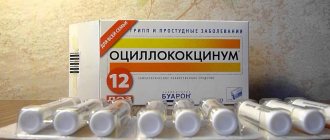Pregnancy and childbirth are left behind, and a new stage in the relationship between mother and baby has begun - the lactation period. It is not recommended to take medications at this time. And the analogue of Ketorol, Ketanov is contraindicated during breastfeeding according to the instructions. But what to do, how to help yourself without harming the child if you are in acute pain?
- Composition of the drug and release form
- Therapeutic effects and indications
- Instructions for use
- Side effects and contraindications
Composition and dosage form
Ketanov is a non-steroidal anti-inflammatory drug with an analgesic effect. There are 2 forms of medication:
- The liquid for injections is light yellow in color; the solution can also be transparent. Each ampoule contains 1 ml of liquid, 5 or 10 pieces per package.
- Round white tablets with “kvt” engraving, 10 pieces in a blister, each pack contains 1, 2, 3, 10 blisters.
Ingredients of 1 ml of liquid for injections:
- Active ingredient – ketorolac trometamol – 0.03 g.
- Additional substances: sodium chloride, disodium salt, ethyl alcohol, caustic soda, sterile liquid.
One tablet contains:
- Active ingredient – ketorolac trometamol – 0.01g.
- Additional substances: corn starch, MCC (cellulose), E551, stearic acid.
Film shell components: food stabilizer E464, polyethylene oxide 400, talc, titanium dioxide, distilled water.
The drug can be taken during lactation only after a doctor's prescription.
Use for hepatitis B
There are different opinions about the possibility of using ketorolac during lactation. The American Academy of Pediatrics has declared it safe for babies. The drug was also included in the international list of drugs approved during breastfeeding.
However, according to the instructions for the drug, Ketanov is prohibited from being combined with lactation, since the active substance passes into breast milk and can cause complications in the child. It was found that after taking 10 mg of ketorolac, the maximum concentration in milk is formed after 2 hours - 7.3 ng per 1 ml. Subsequent techniques contribute to its growth.
Some practitioners allow a one-time use of Ketanov if it is not possible to replace the drug with another painkiller. But it is often extremely undesirable to use it. If after a single dose the pain or fever returns, it is better to consult a doctor about the advisability of further use.
If there is no way to replace Ketanov with another drug, then it is better to take it after feeding the child in order to minimize the penetration of ketorolac into the child’s body. If there is a need to use the medicine for several days, then it would be safer to suspend lactation.
Since the child’s body has not yet fully formed, the suppression of prostaglandin production caused by ketorolac can negatively affect the baby’s health. He may develop adverse reactions in the form of allergic reactions, jaundice, drowsiness, and impaired sucking reflex.
Therapeutic effect
Ketanov is a non-steroidal anti-inflammatory drug that relieves pain, relieves inflammation and reduces temperature. The medication has the most pronounced analgesic effect among drugs in the NSAID group.
This is a strong non-narcotic medication that does not disrupt the functioning of the central nervous system. The drug has a peripheral effect and effectively eliminates severe and moderate pain. Ketorolac trometamol inhibits the activity of COX enzymes that synthesize prostanoids, which cause inflammation, pain and fever.
Thus, ketorolac stops the production of substances that provoke pain, due to which the medication eliminates painful sensations of any origin and localization. A non-narcotic analgesic is used during lactation, but only with the permission of the attending physician.
The analgesic effect of this drug is compared to the effect of powerful narcotic drugs such as Morphine and Omnopon. But the latter, unlike Ketanov, have the following side effects:
- respiratory dysfunction;
- CNS depression;
- sedative effect;
- nausea;
- urinary retention;
- weakening of peristalsis;
- change in myocardial contraction frequency;
- change in blood pressure.
However, according to the instructions, taking Ketanov while breastfeeding is prohibited. In addition, the drug provokes disorders of the blood coagulation system.
Approved drugs during lactation
Many mothers are concerned about the question: is it possible to use Ketanov while breastfeeding?
Yes, in fact, it is an effective pain reliever, but its action is accompanied by some side effects.
In limited quantities and only when absolutely necessary, nursing mothers can use the following painkillers:
It is very important that taking pills is one-time and not systematic. For severe headaches, you can use Ketanov, Paracetamol or No-shpa. Again, the reception should be one-time.
Under no circumstances should you take Analgin, Aspirin and Citramon. The fact is that this group of drugs can cause an allergic reaction in the baby.
Indications
The drug is prescribed to eliminate pain of various origins and localization. Both dosage forms have the same indications. Tablets and injections are used to relieve pain in the postoperative period.
The medication helps eliminate pain resulting from injury to bones, muscles, tendons and other soft tissues. The drug helps relieve pain that occurs as a result of sprains, dislocations, fractures, and bruises.
The drug also helps to relieve pain for a short time in the following conditions:
- pain syndrome as a result of withdrawal of a narcotic painkiller;
- pain due to dental disease (pulpitis, caries, periodontitis);
- pain during a dental procedure;
- with hepatic or renal colic;
- postpartum pain;
- surgical dissection of the perineum during childbirth;
- osteoarthritis;
- inflammation and swelling of the ear;
- rheumatic disease, which is characterized by constant pain in muscles and joints;
- malignant tumors;
- pain resulting from tension or irritation of the sciatic nerve;
- radiculopathy – pain resulting from pinching or irritation of the spinal nerve roots;
- degenerative-destructive lesion of the spine.
The drug should not be used if there is a sharp, acute pain in the abdomen, as this may result in a serious illness that requires urgent surgery. The medication eliminates pain, but does not cure the disease. For this reason, the medicine is used in combination with other medications that eliminate the main cause of pain.
To accept or not to accept?
Some mothers are ready to endure unbearable pain, crawl on their knees and break their nails against the wall, but just not take a painkiller that can harm her baby. This extreme has no right to exist. The fact is that a nursing woman’s body is very sensitive and reacts to even the slightest changes in the environment.
Based on all of the above, we can conclude: one approved painkiller tablet will not harm the baby, but only if the nursing mother replaces her milk with artificial formula for one feeding. In emergency situations, you can take a pill and feed the child, but under no circumstances should such phenomena be allowed to occur on a systematic level. You shouldn’t endure unbearable pain: a nervous and exhausted mother is of little use, and the kids feel it.
Method of administration, dosage
Ketanov in tablet form is taken orally and does not need to be chewed. Take the tablet with water (half a glass). If you take the medicine after a meal, its negative effect on the inner lining of the gastrointestinal tract will decrease. If the patient takes the pill after a fatty meal, the therapeutic effect will appear a little later.
If your goal is to quickly eliminate pain, then take the medication before meals. If you are taking a painkiller as needed (as a result of severe pain), then take 1 tablet. If you are taking the medicine on a schedule, then drink 1 piece three times a day with an interval of 6-7 hours.
For severe pain, increase the dosage to 2 tablets three times in 24 hours. If tablets are used to relieve pain, then the maximum daily dose is 7 pieces, and if the injection solution is 30 mg.
If the patient weighs up to 50 kg, has kidney disease and is over 55 years old, then he should take 1/2 tablet at a time. The duration of the course of treatment is a week.
What is the best way to replace the drug?
Ketanov can be replaced with painkillers that are prescribed to children. It can be:
It is best to take medications after feeding. Then, before the next time, the medicine will already be partially eliminated from the mother’s body. The likelihood of the medication entering the child’s body in high concentrations will be reduced.
Ketanov can be replaced with Paracetamol (or its analogue Dafalgan). This drug is approved for use during lactation due to the absence of substances in its composition that are potentially dangerous to the child. When using the product, do not exceed the recommended dosage. This will ensure that the medicine passes into breast milk in minimal quantities. You can use Pentalgin. The concentration of paracetamol in its composition is small, but its effect is enhanced by excipients.
Pregnancy and childbirth are left behind, and a new stage in the relationship between mother and baby has begun - the lactation period. It is not recommended to take medications at this time. And the analogue of Ketorol, Ketanov is contraindicated during breastfeeding according to the instructions. But what to do, how to help yourself without harming the child if you are in acute pain?
Contraindications and side effects
There are permanent and temporary contraindications to the use of Ketanov. For permanent cases, it is prohibited to take the medication under any circumstances, and for temporary cases, a painkiller is used, but this process must be supervised by a doctor.
Permanent contraindications:
- hypersensitivity to the components of the drug;
- bronchial asthma due to taking non-steroidal anti-inflammatory drugs;
- bronchial obstruction;
- Quincke's edema;
- dehydration;
- decrease in blood volume;
- erosive and ulcerative damage to the gastrointestinal tract;
- peptic ulcer;
- poor blood clotting;
- impaired liver or kidney function;
- bleeding in the brain or a tendency to bleed;
- hematopoiesis disorder;
- during pregnancy and breastfeeding;
- children under 17 years of age;
- chronic diseases.
Nonsteroidal anti-inflammatory drugs sometimes cause side effects. From the central nervous system - migraines, sleepiness, vertigo, viral meningitis, stress. Also increased activity, mental disorders.
From the gastrointestinal tract - impaired defecation, cramping pain in the stomach, increased gas formation, inflammation of the oral mucosa, nausea. In rare cases - erosive and ulcerative damage to the digestive tract, hepatitis.
Side effects from the respiratory system - runny nose, bronchospasm, edematous laryngitis. From the genitourinary system - functional kidney failure, Gasser's disease, kidney inflammation, etc.
Possible increased blood pressure, loss of consciousness, swelling of the lungs, anemia. The patient may experience ringing in the ears, decreased hearing, possible visual disturbances, and bleeding. An allergy occurs in the form of a rash, itching, changes in skin tone, difficulty breathing, swelling, etc.
The principle of action of Ketanov and its effect on the child’s body
The drug has an anti-inflammatory and analgesic effect. Its principle of action is similar to morphine. It is often used for headaches, toothaches, muscle injuries and sprains. However, during lactation this drug should be used with extreme caution. The fact is that Ketanov contains analgesic components, which, penetrating into breast milk, can cause harm to the baby. That is why, when taking the pill, it is advisable to give up breastfeeding for a while, replacing mother's milk with a child's family.
Some babies will not react at all to taking the drug, and in other cases the development of jaundice, impaired sucking reflex and drowsiness have been noted.
Do not think that a small dose of painkiller will not affect the baby’s development in any way. Analgesic components have a significant impact on metabolic processes in the child’s body. In simple terms, even one tablet will enter the small tummy along with the mother’s breast milk. That is why taking various medications during lactation should be done with extreme caution.
In addition, Ketanov can affect the production of breast milk. It is advisable to consult with a specialist and choose an effective and safe pain reliever for the child. In addition, at present there are many analogues of Ketanov, which have a minor effect on the baby’s body.











